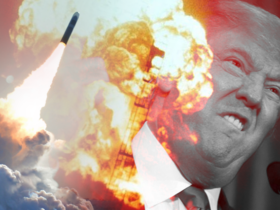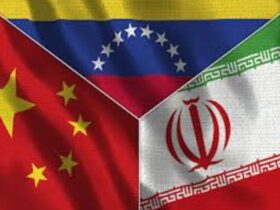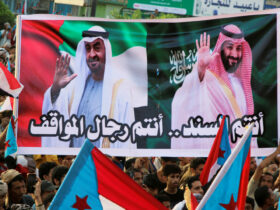For some reason, seeing the flags of Israel and Germany hanging side by side at the entrance did not strike me as surprising.
For some reason, seeing the flags of Israel and Germany hanging side by side at the entrance did not strike me as surprising.
By Halim Gençoğlu
While attending an international conference in Germany, I had the opportunity to visit the Berlin Humboldt Museum, a place where history is carefully curated and cultures from across the globe are represented. However, one notable absence caught my attention: a missing section of Shia Islamic artifacts. According to museum staff, the removal was prompted by recent tensions between Iran and Israel. This act—subtle but telling—reflects how far-reaching the geopolitical impact of Middle Eastern conflicts has become, even influencing cultural institutions thousands of miles away.
This symbolic erasure underscores a troubling trend in Western policy and public discourse: a double standard that consistently favors Israel, despite its increasingly aggressive regional posture. The most recent development—a sudden, targeted Israeli airstrike on Iranian territory that reportedly killed a high-ranking Iranian general—has pushed the Middle East closer to a dangerous tipping point. It also lays bare the troubling dynamics of unchecked military action and diplomatic impunity that have long shaped the Israeli-Iranian relationship.
A Dramatic Escalation with Global Implications
The Israeli strike was not just a military maneuver—it was a loud political message. Israel, which has for years pursued a policy of preemptive strikes against perceived threats in the region, once again chose confrontation over diplomacy. Iranian military leaders, often tied to Tehran’s support for regional non-state actors like Hezbollah or various Shia militias in Syria and Iraq, have long been targets of Israeli intelligence. However, this latest operation—executed deep within Iran’s sovereign territory—marks a chilling escalation.
For critics of Israeli policy, the strike serves as yet another example of Tel Aviv’s pattern of violating international norms with impunity. The airstrike did not occur in a vacuum. It follows months of spiralling violence across the Middle East, including the devastating war in Gaza, repeated Israeli airstrikes in Syria, and rising tensions with Hezbollah in Lebanon. Together, these events suggest a broader strategy of intimidation and destabilization, one justified domestically as defense but perceived regionally as aggression.
The Role of the United States: Support or Silence?
Central to the debate is the role of Israel’s most powerful ally: the United States. For decades, Washington has provided Israel with nearly unconditional support—billions in military aid, diplomatic backing at the United Nations, and access to high-level intelligence-sharing networks. This alliance, rooted in both strategic and ideological commitments, has shielded Israel from most international censure.
Although American administrations occasionally express concern over specific Israeli policies—such as settlement expansion or the humanitarian toll in Gaza—these criticisms rarely translate into meaningful pressure or change. Instead, the pattern has remained consistent: the U.S. acts more like an enabler than an impartial broker, further emboldening Israel’s actions while stifling opportunities for regional diplomacy.
This asymmetry in international accountability has serious consequences. When state actors can violate another country’s sovereignty without repercussions, it undermines the rule of law and sets a precedent that violence—not negotiation—is the preferred tool of foreign policy.
Cultural Reflections of Political Realities
Back in Berlin, the subtle exclusion of Shia artifacts from the Humboldt Museum is more than a curatorial decision—it is a microcosm of the broader geopolitical narrative. It highlights how cultural representation, or the lack thereof, can mirror and reinforce prevailing political biases. In this case, it also reflects the growing discomfort many Europeans feel about being seen as complicit in the excesses of Israeli policy.
Despite the official positions of Western governments, public sentiment in countries like Germany is shifting. Many German citizens, mindful of their country’s historical responsibility and its ethical obligations, are increasingly vocal in their opposition to what they view as Israel’s disproportionate and often brutal use of force not only in Gaza, but now, in Iran as well.
Türkiye’s Potential Role in De-escalation
In the midst of rising tensions, the Republic of Türkiye stands uniquely positioned to play a constructive role. With deep historical, cultural, and religious ties to both Iran and the Arab world—and as a NATO member with connections to the West, Türkiye could serve as a much-needed mediator.
Ankara has long championed regional diplomacy, and now could be the time for it to renew that commitment by offering to host peace talks. Rather than contributing to further militarization, Türkiye could help build a platform for meaningful dialogue—one that priorities mutual respect, sovereignty, and regional cooperation.
Toward a Future of Dialogue and Dignity
The killing of an Iranian general may dominate headlines today, but it does not address the underlying causes of regional instability. Military strikes may bring temporary tactical advantage, but they do not foster long-term peace. What the Middle East needs now is not more missiles, but more diplomacy—not domination, but dignity.
As Nelson Mandela once said, “Freedom is indivisible; the chains on any one of my people were the chains on all of them.” In that spirit, true peace in the Middle East can only come when all people Palestinians, Israelis, Iranians, Lebanese, Syrians are granted the same dignity, the same security, and the same right to self-determination.
In the absence of accountability and genuine dialogue, the region risks plunging further into chaos. But if bold leadership emerges, leadership willing to prioritize justice over vengeance and peace over provocation—then perhaps the current crisis can serve not as a gateway to war, but as a turning point toward reconciliation.
References
Associated Press. (2025, June 16). Israel’s spy agency used AI and smuggled-in drones to prepare attack on Iran. AP News. https://apnews.com/article/a504ee31c70857c8d86a0d066997e344
Borger, J. (2025, June 16). Explainer: What we know so far in the Israel-Iran conflict. The Guardian. https://www.theguardian.com/world/2025/jun/16/israel-iran-conflict-what-we-know-so-far-explainer
The Guardian. (2025, June 17). Trump demands Iran’s ‘unconditional surrender’ – as it happened. The Guardian. https://www.theguardian.com/world/live/2025/jun/17/israel-iran-conflict-live-updates-tehran-trump-evacuation-middle-east
Arabic sources (المصادر العربية)
Al Jazeera. (2025, June 18). قدرات قنبلة خارقة للتحصينات قد تستخدمها واشنطن لضرب إيران. https://www.aljazeera.net/news/2025/6/18/قدرات-قنبلة-خارقة-للتحصينات-قد
Al-Araby Al-Jadeed. (2025, June 17). الحرب الإسرائيلية الإيرانية: ترقب لقرار ترامب بشأن استهداف طهران. https://www.alaraby.co.uk/politics/الحرب-الإسرائيلية-الإيرانية-ترقب-لقرار-ترامب
Sky News Arabia. (2025, June 17). مواجهة إسرائيل وإيران.. آخر التطورات. https://www.skynewsarabia.com/live-story/1802758-إسرائيل-تضرب-إيران
Al-Ghad TV. (2025, June 18). هجوم إيراني جديد.. صواريخ طهران الفرط صوتية تخترق دفاعات إسرائيل. https://www.alghad.tv/أخبار-الغد/news/هجوم-إيراني-جديد-صواريخ-طهران
Asharq Al-Awsat. (2025, June 18). مَن هم القادة الإيرانيون الذين قُتلوا في الضربات الإسرائيلية؟ https://aawsat.com/شؤون-إقليمية/القادة-الإيرانيون-في-الضربات
CNBC Arabia. (2025, June 18). وزير الخارجية الصيني: الهجوم الإسرائيلي على إيران ينتهك القانون الدولي. https://www.cnbcarabia.com/الهجوم-الإسرائيلي-على-إيران-ينتهك-القانون
Turkish Sources
Anadolu Ajansı. (2024, Ekim 26). İsrail, İran’daki askeri hedefleri vurduğunu duyurdu. Anadolu Ajansı.bild.debbc.com+7aa.com.tr+7tr.euronews.com+7
Anadolu Ajansı. (2024, Ekim 28). İran Savunma Bakanı: İsrail’in saldırısında küçük hasar meydana geldi. Anadolu Ajansı. aa.com.tr+2aa.com.tr+2aa.com.tr+2
Anadolu Ajansı. (2024, Ekim 1). İran, İsrail’e yönelik füze saldırısı düzenledi. Anadolu Ajansı.aa.com.tr+1tr.euronews.com+1
VOA Türkçe. (2024, Ekim 26). İran’daki askeri hedeflere hava saldırıları düzenleyen İsrail, misillemenin sona erdiğini açıkladı. VOA Türkçe. time.com+15voaturkce.com+15bbc.com+15
VOA Türkçe. (2024, Nisan 15). Türkiye, İran’ın İsrail saldırısına ne tepki verdi? VOA Türkçe. voaturkce.com
BBC News Türkçe. (2024, Ekim 26). İsrail’in İran’a saldırıları: İsrail İran’a neden saldırdı, Tahran yanıt verecek mi?BBC News Türkçe. tr.euronews.com+3bbc.com+3bbc.com+3
Euronews Türkçe. (2024, Ekim 26). İsrail, İran’daki askeri hedeflere saldırı düzenlediğini açıkladı. Euronews.reddit.com+12tr.euronews.com+12voaturkce.com+12
















Leave a Reply